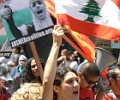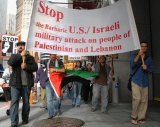Feature Archives
Wed Aug 9 2006 (Updated 08/16/06)
In the Struggle of Unequals the Anti-War Movement Must Take a Stand
Alessandro Tinonga writes: The war against Lebanon is absolutely shocking. According to the BBC, the number of Lebanese casualties may be as high as 900 after nearly four weeks of fighting. Almost one third of the dead are children under the age of 12. Latest UN estimates for displaced people in Lebanon put the figure at between 700,000 and 800,000.
For those of us in the anti-war movement, we must take a stand against the violence being perpetrated against the Lebanese and the Palestinian people. However, there is a clear point of division amongst the anti-war movement: how to address the issue of national liberation. This division manifests itself in many ways ranging from a political statements from major anti-war organizations like United for Peace and Justice, or the hesitancy of some elements of the Santa Cruz anti-war movement to have a united demonstration last Friday against the war.
For those of us in the anti-war movement, we must take a stand against the violence being perpetrated against the Lebanese and the Palestinian people. However, there is a clear point of division amongst the anti-war movement: how to address the issue of national liberation. This division manifests itself in many ways ranging from a political statements from major anti-war organizations like United for Peace and Justice, or the hesitancy of some elements of the Santa Cruz anti-war movement to have a united demonstration last Friday against the war.
Mon Aug 7 2006 (Updated 08/13/06)
SF Rallies For People of Palestine and Lebanon
On Saturday, August 12th, there were anti-war marches in San Francisco, Los Angeles, Seattle, and Washington, DC. The protests demanded an end to the destruction of Lebanon, an end to US aid for Israel, and "money for jobs and education, not for war and occupation." In San Francisco, several thousand protesters gathered in Civic Center at 11am before marching up Market St. around 12:30pm and returning to Civic Center for another rally at 2pm.
Photos: 1 | 2 | 3 | 4 | 5 | 6 | 7 | 8 | 9 | 10 | 11 | 12 | 13 Video: 1 | 2 | 3 | Audio
Photos: 1 | 2 | 3 | 4 | 5 | 6 | 7 | 8 | 9 | 10 | 11 | 12 | 13 Video: 1 | 2 | 3 | Audio
Mon Jul 31 2006 (Updated 08/03/06)
Civilians Massacred in Qana as UN and Israel Refuse To Stop Attacks
On July 30th, Israeli planes dropped a precision-guided US made bomb on a building in the Shiite village of Qana killing more than 28 people, including many children. With the bodies of slain children being dug out from under the rubble of buildings, Lebanon told US Secretary of State Condoleezza Rice she would be unwelcome in the country without an immediate ceasefire. While Israel has vowed to increase its attacks and the US, British and German governments are still openly opposing a ceasefire, public outrage around the world is growing.
In San Francisco, a protest was held on August 1st in front of the Federal building.
Photos:
1
|
2
|
3
|
4
Thu Jul 27 2006 (Updated 08/01/06)
World Outraged At Destruction Of Lebanon, Governments Complicit
On July 27th, the Arab American Anti-Discrimination Committee held a protest against the war in Lebanon in front of Senator Feinstein’s Office in San Francisco.
After a spirited rally, hundreds marched to the SF Chronicle building, where 8 activists were arrested
 Photos:
1
|
2
|
3
|
4
|
5
|
6
|
Photos:
1
|
2
|
3
|
4
|
5
|
6
|
 Video:
1
|
2
|
3
|
Fact sheet and flier
Video:
1
|
2
|
3
|
Fact sheet and flier
An international conference in Rome held Wednesday July 26th ended without a call for a ceasefire. Condoleezza Rice stood virtually alone in opposing any language suggesting that the Israeli onslaught, which has already caused close to 500 civilian deaths and destroyed much of the country’s infrastructure, should be ended any time soon. Also on Wednesday, the US blocked theU.N. Security Council from issuing a statement that would have condemned the Israeli bombing of a UN compound in Southern Lebanon.
 Photos:
1
|
2
|
3
|
4
|
5
|
6
|
Photos:
1
|
2
|
3
|
4
|
5
|
6
|
 Video:
1
|
2
|
3
|
Fact sheet and flier
Video:
1
|
2
|
3
|
Fact sheet and flier
An international conference in Rome held Wednesday July 26th ended without a call for a ceasefire. Condoleezza Rice stood virtually alone in opposing any language suggesting that the Israeli onslaught, which has already caused close to 500 civilian deaths and destroyed much of the country’s infrastructure, should be ended any time soon. Also on Wednesday, the US blocked theU.N. Security Council from issuing a statement that would have condemned the Israeli bombing of a UN compound in Southern Lebanon.
Thu Jul 27 2006
Israel Bombs UN Compound, US Blocks Condemnation
On Tuesday July 25th, Israel bombed a UN compound in South Lebanon killing Canadian, Finnish, Austrian and Chinese nationals. The UN warned Israel with at least 10 separate telephone that repeated aerial and artillery attacks had already landed at or dangerously close to their post in Khiam and an internal UN report on the incident says there were more than 20 aerial and artillery attacks on the post on Tuesday, including four artillery rounds that directly hit the UN position an hour before the fatal guided bomb attack. The report also said that, each time the UN called to complain, the Israeli officer they talked to promised that the attacks would stop but the strikes continued.
Kofi Annan, the United Nations secretary general, condemned Israel, saying he was shocked by the "apparently deliberate targeting" of the post, and called for it to investigate the incident.
On Wednesday, the US blocked the U.N. Security Council from issuing a statement that would have condemned the bombing as much of the right-wing Israeli media used Annan's condemnation as an excuse to lash out at the UN.
Israel under fire for killing UN monitors | Israelis Kill UN Peacekeepers - Halutz Commits to War Crimes
Kofi Annan, the United Nations secretary general, condemned Israel, saying he was shocked by the "apparently deliberate targeting" of the post, and called for it to investigate the incident.
On Wednesday, the US blocked the U.N. Security Council from issuing a statement that would have condemned the bombing as much of the right-wing Israeli media used Annan's condemnation as an excuse to lash out at the UN.
Israel under fire for killing UN monitors | Israelis Kill UN Peacekeepers - Halutz Commits to War Crimes
Sat Jul 22 2006 (Updated 07/23/06)
US rushes bombs to Israel and discourages cease-fire Lebanon buries its dead
The Bush administration is reportedly rushing a delivery of precision-guided bombs to Israel.
Citing senior US officials, the New York Times said the decision to ship the weapons quickly came after relatively little debate within the administration. While many in Israel are now speaking out against the war, the Democrats in the US are solidly pro-war.
On Sunday, July 23, Dianne Feinstein lead a noon rally in San Francisco supporting the destruction of Lebanon.
Green Party candidate for U.S. Senate Todd Chretien joined other anti-war activists who engaged in a counter-protest.
Photos
The total number of Lebanese deaths so far is not known; mounds of rubble sit undisturbed since rescue workers are too fearful of missiles to search for bodies. The number of confirmed civilian deaths in Lebanon is now over 380.
The total number of Lebanese deaths so far is not known; mounds of rubble sit undisturbed since rescue workers are too fearful of missiles to search for bodies. The number of confirmed civilian deaths in Lebanon is now over 380.
Thu Jul 20 2006 (Updated 07/21/06)
As World Evacuates Thousands... What About the Lebanese
Nations around the world are struggling to evacuate tens of thousands of their citizens from Lebanon as Israel continues its bombardment of the country. Britain, along with other European countries and the United States, is using Cyprus as the hub of their operations for full-scale evacuations as the fighting intensifies.
Jonathan Cook writes for Electronic Lebanon: "If anyone doubted the racism of our Western media, here it was proudly on display. The BBC apparently considers their Beirut reporter's first duty to find out what meals HMS Gloucester's chef will be preparing for the evacuees. Lebanese and Palestinian civilians die unnoticed by the Western media (though not by the Arab channels) while we learn of onboard sleeping arrangements on the ship bound for Cyprus."
The racist subtext of the evacuation story | Evacuation of the American University in Beirut | Letter from a Young Lebanese-American Woman | The fear is growing in Beirut | Srifa was a bustling hillside village. Then yesterday the Israeli jets came | Leila Buck: From Damascus | Slow U.S. evacuation plans leave thousands stranded | Britain set for largest evacuation since Dunkirk | Beirut burns | U.S., European countries work to vacate nationals from Lebanon
Jonathan Cook writes for Electronic Lebanon: "If anyone doubted the racism of our Western media, here it was proudly on display. The BBC apparently considers their Beirut reporter's first duty to find out what meals HMS Gloucester's chef will be preparing for the evacuees. Lebanese and Palestinian civilians die unnoticed by the Western media (though not by the Arab channels) while we learn of onboard sleeping arrangements on the ship bound for Cyprus."
The racist subtext of the evacuation story | Evacuation of the American University in Beirut | Letter from a Young Lebanese-American Woman | The fear is growing in Beirut | Srifa was a bustling hillside village. Then yesterday the Israeli jets came | Leila Buck: From Damascus | Slow U.S. evacuation plans leave thousands stranded | Britain set for largest evacuation since Dunkirk | Beirut burns | U.S., European countries work to vacate nationals from Lebanon
Palestine:
 33
33








